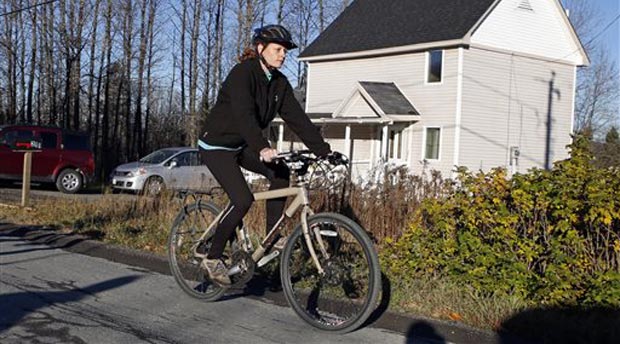
Nurse Kaci Hickox leaves her home on a rural road in Fort Kent, Maine, to take a bike ride with her boyfriend Ted Wilbur, Thursday, Oct. 30, 2014. The couple went on an hour-long ride followed by a Maine State Trooper. State officials are going to court to keep Hickox in quarantine for the remainder of the 21-day incubation period for Ebola that ends on Nov. 10. Police are monitoring her, but can’t detain her without a court order signed by a judge. AP
FORT KENT, Maine—In between going on a bike ride and taking delivery of a pizza, nurse Kaci Hickox and her boyfriend did chores and watched a movie while state officials struggled to reach a compromise in a standoff that has become the nation’s most closely watched clash between personal freedom and fear of Ebola.
The nurse who treated Ebola patients in Sierra Leone and her boyfriend, Ted Wilbur, purposefully rode their bikes away from town on a dirt path to avoid coming into contact with people.
“We’re not trying to push any limits here. We’re members of this community, too, and we want to make people comfortable,” he told reporters Thursday evening.
Hickox, who returned to the U.S. last week, has been under what Maine is calling a voluntary quarantine at her home in this town of 4,300 people.
She has rebelled against the restrictions, saying that her rights are being violated and that she is no threat to others because she has no symptoms. She tested negative last weekend for Ebola, though it can take days for the virus to reach detectable levels.
State officials said that they were seeking a court order to require a quarantine through Nov. 10, the end of the 21-day incubation period for the Ebola virus.
But it was unclear Thursday whether the state had gone to court or whether there had been any progress in negotiations aimed at a compromise.
Gov. Paul LePage said state attorneys and Hickox’s lawyers had discussed a scaled-down quarantine that would have allowed her to go for walks, runs and bicycle rides while preventing her from venturing into populated public places or coming within 3 feet (0.9 meters) of others.
“I was ready and willing — and remain ready and willing — to reasonably address the needs of health care workers meeting guidelines to assure the public health is protected,” he said.
Hickox stepped into the media glare when she returned from West Africa to become subject to a mandatory quarantine in New Jersey. After an uproar, she was released and traveled more than 600 miles (965 kilometers) to the small town on the Canadian border where she lives with her boyfriend.
At their home, reporters have been camped out for two days.
Wilbur said he and Hickox spent the day Thursday vacuuming, cleaning, doing laundry and watching a movie, “The Avengers.” He said he also spent four hours attending class via phone. He has agreed to stay away from the University of Maine at Fort Kent for the time being.
During their hour-long bike ride, they were followed by an unmarked state police cruiser. Later, they took delivery of a pizza.
States have broad authority under long-established law to quarantine people to prevent the spread of disease. In Maine, state law allows a judge to confine someone if health officials demonstrate “a clear and immediate public health threat.”
President Barack Obama and humanitarian groups have warned that such measures could cripple the fight against the disease at its source by discouraging volunteers like Hickox from going to West Africa, where the outbreak has sickened more than 13,000 people and killed nearly 5,000 of them.
“The volunteers are heroes to the people they help, and they are heroes to our own countries. They should be treated like heroes when they return,” Samantha Power, U.S. ambassador to the United Nations, said in Brussels.